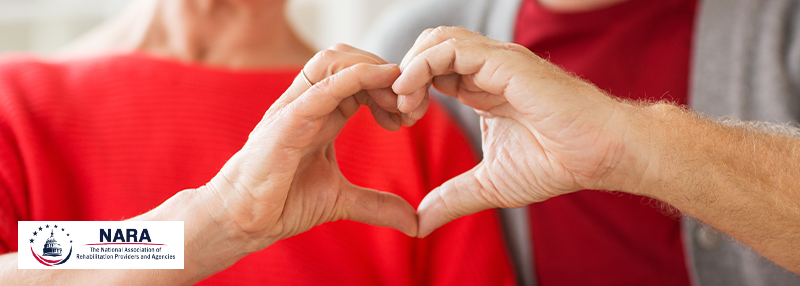Posted On: February 5, 2025 by NARA in: Healthcare Heart Health Tips

February is American Heart Month, a time to raise awareness about the importance of cardiovascular health and take action to prevent heart disease. As a rehabilitation professional, you play a critical role in promoting heart health and integrating heart-healthy practices into your rehabilitation programs.
The Importance of Cardiovascular Health in Rehabilitation
Cardiovascular disease is a leading cause of death and disability in the United States, and it is a common comorbidity in many rehabilitation populations. According to the American Heart Association, more than 40% of adults in the United States have some form of cardiovascular disease.
Rehabilitation professionals have a unique opportunity to promote cardiovascular health and reduce the risk of heart disease in their patients. By integrating heart-healthy practices into rehabilitation programs, you can help your patients achieve better outcomes and improve their overall health and well-being.
Understanding Cardiac Rehabilitation
Cardiac rehabilitation is a comprehensive, medically supervised program designed to improve cardiovascular health for those who have experienced heart attacks, heart failure, angioplasty, or heart surgery. It involves three key components:
- Exercise Counseling and Training: Exercise is crucial for heart health. Cardiac rehab programs include personalized exercise plans to help patients improve their cardiovascular fitness.
- Education for Heart-Healthy Living: Patients learn about managing risk factors, making heart-healthy nutrition choices, and adopting lifestyle changes to support heart health.
- Counseling to Reduce Stress: Stress management is vital for heart health. Patients receive support to identify and manage stressors that can impact their cardiovascular system.
Benefits of Cardiac Rehabilitation
Participating in a cardiac rehabilitation program offers numerous benefits, including:
- Improved Cardiovascular Fitness: Regular exercise helps strengthen the heart and improve overall cardiovascular health.
- Better Management of Risk Factors: Education and counseling help patients manage conditions like high blood pressure, high cholesterol, and diabetes.
- Enhanced Quality of Life: Patients often experience improved physical and mental well-being, leading to a better quality of life.
- Reduced Risk of Future Heart Problems: By adopting heart-healthy habits, patients can lower their risk of future heart issues.
Integrating Heart-Healthy Practices into Rehabilitation Programs
As a rehabilitation professional, you can incorporate various heart-healthy practices into your programs:
- Aerobic Exercise: Include activities like brisk walking, cycling, or swimming to improve cardiovascular fitness.
- Healthy Eating Habits: Encourage a balanced diet low in sodium, sugar, and saturated fat, and high in fruits, vegetables, and whole grains.
- Stress Management Techniques: Stress can have a negative impact on cardiovascular health. Teach patients techniques like meditation, deep breathing, or yoga to manage stress.
- Blood Pressure Monitoring: Regularly monitor patients' blood pressure and help them develop plans to manage it if necessary.
- Smoking Cessation: Smoking is a major risk factor for heart disease. Provide resources and support to help patients quit smoking.
Stay Healthy and Educated This American Heart Month and Beyond
American Heart Month is a great opportunity to raise awareness about the importance of cardiovascular health and take action to promote heart health in your patients. By integrating heart-healthy practices into your rehabilitation programs, you can help your patients achieve better outcomes and improve their overall health and well-being.
Get Involved
At NARA, we're committed to supporting rehabilitation providers and their patients in achieving their goals. Join our community to connect with others, share your experiences, and access valuable resources and tools!

0 comments